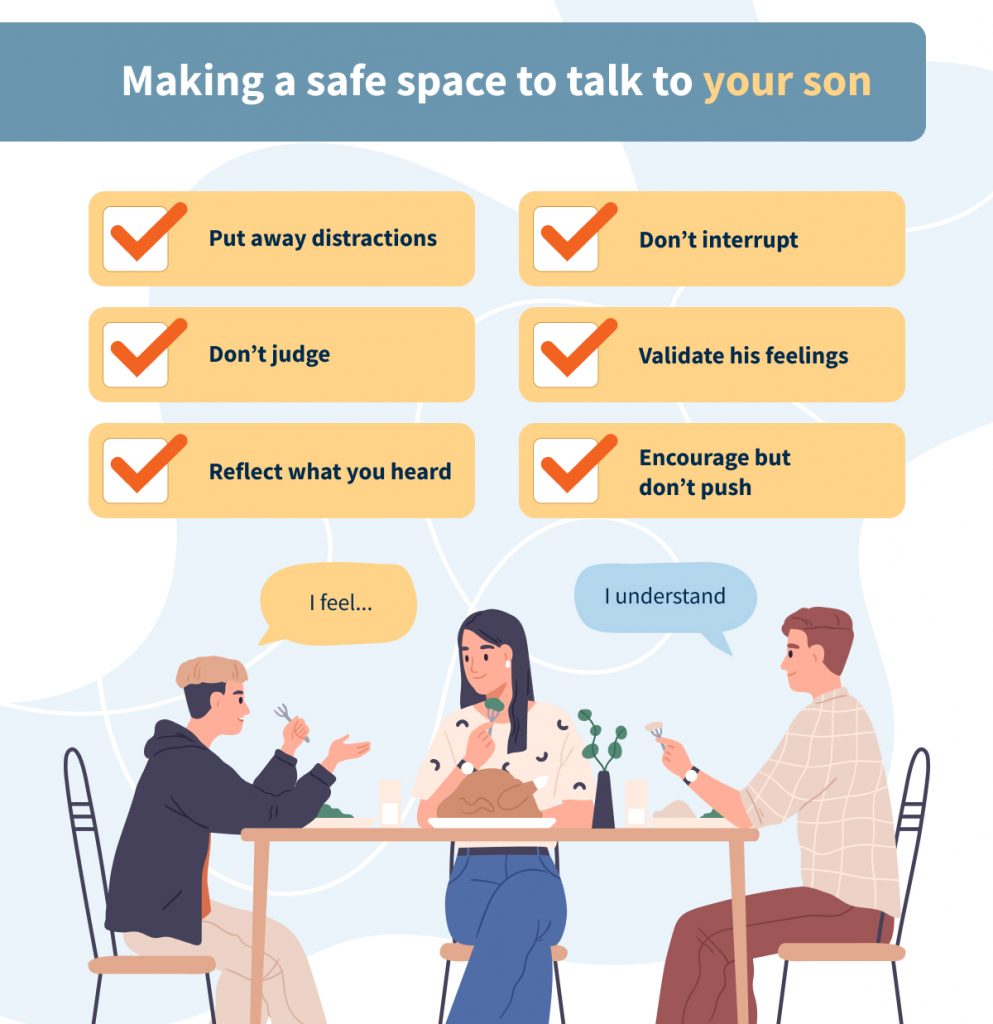When your son is struggling with his mental health, you might feel powerless. You know that he’s not doing his best. You can tell he’s hurting. You know he needs help. But will he accept it? Your love and support will go a long way in helping him learn how to take care of his mental health, and just learning about what you can do shows you care.
Is it his mental health? Or is he just a teenager?
Your son will do things that drive you crazy. He might forget to do his chores, stay up all night on his phone, and argue just for the sake of arguing. When something is truly wrong, though, you’ll probably be able to tell. He won’t seem like himself. You might notice him:
- Withdrawing from friends
- Having mood swings or extreme emotions
- Stop eating and lose weight, or obsess about his body image
- Overeating and quickly gaining weight
- Always staying in his room
- Staying glued to his phone or computer even
- Sleeping too much or having trouble sleeping
- Losing interest in hobbies and activities he used to enjoy
- Having difficulty concentrating or performing well in school
You might be tempted to try and diagnose him or figure out what’s going on, but you don’t have to have the answers. It’s better to just start the conversation with him and start looking for professional help.
How to talk to your son about his feelings
Chance are, you’ve had a hard time talking about your feelings with someone—your son probably feels the same way. It might be especially hard for him since young men are often told to keep their feelings bottled up, that it’s weak to talk about them.
Encouraging your son to share his thoughts and feelings requires your patience and understanding, and a supportive, judgment-free environment. There is good news, though: you can foster open communication and build trust, one conversation at a time.
Create a safe space
Your son needs to feel safe before he can truly express himself. Timing and setting play a crucial role in this. Choose time when he’s relaxed—maybe during a car ride or just after something he enjoys, like playing a game or cooking. Casual moments can feel less intimidating and remove the pressure of a “serious talk.”
Make it clear that in your conversations, you’re not there to criticize or judge. Use a calm and steady tone to reassure him that your goal isn’t to lecture but to understand and support. Sometimes just saying, “I’m here for you, and I want to help” can open a way for your son to open up.
Practice active listening
Once your son starts sharing, your role isn’t to have all the answers right away. Your job is to listen. Active listening shows him that his feelings matter and reinforces that you’re invested in his feelings.
Here are some ways to practice active listening effectively:
- Give him your full attention by putting away distractions, like your phone, and focus entirely on him.
- Stay neutral and avoid interrupting or jumping to conclusions. Instead of reacting with shock or concern, try nodding or using gentle phrases like, “That sounds really tough. Tell me more.”
- Reflect and validate by repeating back or paraphrasing what he said can make him feel understood. For example, “It sounds like you’re feeling stressed about school because the workload feels overwhelming.”
- Encourage, but don’t push if he doesn’t feel like talking. Respect his boundaries. You can gently check in later rather than pressuring him to engage immediately.
Avoid stigma
Teenagers are especially sensitive to the fear of being judged or misunderstood. Boys are growing up in a digital era where they can quickly and easily be exposed to toxic ideas about their emotions. When you talk to him, let him know how important his feelings are and that it’s normal to get upset about things.
Saying things like, “It’s okay to feel this way, and it’s also okay to ask for support,” can help reduce the shame or hesitancy your son might feel. Avoid dismissive comments like, “You’ll get over it,” or “That’s not a big deal,” as these can unintentionally invalidate his experiences. Instead, focus on messages that make him feel safe, heard, and accepted.
Foster long-term trust
Building trust isn’t about a single conversation. You have to show up consistently. Demonstrate how he can rely on you through your actions, whether it’s by respecting his privacy, keeping your word, or simply being there when he needs someone. By reinforcing that you’re a constant source of support, you’ll create a foundation where he feels more comfortable sharing deeply over time.
When is it time to find professional mental health support?
While mood shifts and occasional arguments are normal parts of growing up, some signs point are clear that it’s time for professional intervention.
- Expressions of self-harm or suicidal thoughts: When he says things like “I don’t want to be here anymore,” or you notice signs of physical self-harm, it requires immediate attention.
- Disruptions to daily functioning: If he’s having a hard time completing tasks, withdrawing from friends or family, or an inability to get out of bed regularly signal significant distress.
- Intense emotional outbursts or withdrawal: If he can’t seem to get over being angry or sad, or if he’s completely shutting down emotionally, he’s probably dealing with something deeper.
- Declining school performance: If your son is struggling to focus, turning in late assignments, or refusing to attend school, these behaviors may stem from mental health challenges.
- Unexplained physical complaints: Recurring headaches, stomach aches, or other physical symptoms without a clear cause can be linked to stress, anxiety, or depression.
Your son’s mental health is as important as his physical health. He’ll learn that he needs to take care of both to thrive in life. Your role as a parent means that you should be helping him figure out how. There will likely be times when you have to learn together, and that’s okay.
Taking care of your own mental health
Supporting your son’s mental health starts with taking care of your own. Self-care isn’t selfish. It’s essential. When you take care of yourself, you’re better equipped to respond to his needs with patience and empathy.
- Build a support system with trusted friends, family members, or parent support groups. Sharing your journey lightens the emotional load and provides new perspectives.
- Make time for stress management strategies such as deep breathing, light exercise, yoga, mindfulness, or journaling. Even simple moments of quiet reflection or a brisk walk outside can help you reset.
- Fuel your body with nutritious meals, move regularly, and make quality sleep a priority. These foundations help you maintain energy and balance, even through difficult times.
If you feel overwhelmed, sad, or anxious to the point that it affects everyday life, reaching out to a counselor or therapist can help you process your emotions, develop coping skills, and prevent burnout. By caring for yourself, you model healthy habits for your son and ensure you have the strength and clarity to stand by his side throughout his journey.
Call Family First when you need help
Our team of experts has more than 120 years of combined clinical experience. We offer programs that support mental health for boys in Florida, and we’re here when you need support. You don’t have to do it alone. Call 888.904.5947 or contact us online to get the support your son and family need to thrive.


